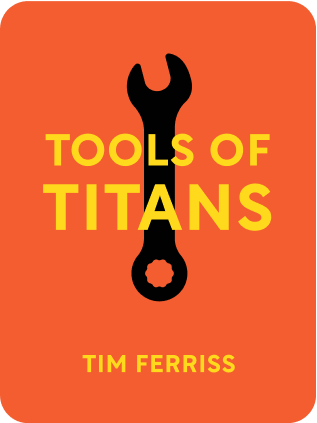

This article is an excerpt from the Shortform book guide to "Tools of Titans" by Timothy Ferriss. Shortform has the world's best summaries and analyses of books you should be reading.
Like this article? Sign up for a free trial here .
Do you struggle to find that one perfect idea and hold yourself back from entertaining less-than-perfect ideas? What can you do to increase your chances of getting novel, original ideas?
No matter what field of work you’re in, you’d likely benefit from being more creative and generating more good ideas. The most important rule of thumb to follow is to brainstorm lots of ideas.
Here’s a spread of advice from Tim Ferriss on how to generate ideas, how to identify the best ones, and how to put them to action.
Generate a Lot of Bad Ideas to Get Good Ideas
To increase your idea output, spend your energy coming up with LOTS of ideas, even if they’re silly. What matters isn’t your hit rate, but rather the number of good ideas you have at the end. The more ideas you generate, the more you exercise your “idea muscle.”
Multiple people reinforce this idea:
- Author James Altucher challenges himself to come up with 10 ideas a day. These aren’t necessarily business ideas, but also around themes like “10 ways I can save time,” “10 ridiculous inventions,” or “10 ways to solve a problem I have.”
- Author Malcolm Gladwell comes up with as many ideas as possible, scrutinizes them, and kills them off. The unkillable ideas are worth going forward with.
- Many writers don’t believe that writer’s block exists. Author Paulo Coelho (The Alchemist) says that even if he doesn’t feel inspired, he enforces the discipline of writing his way out.
- IBM had a notably effective salesforce, and they did so by setting sales quotas low. This prevented salespeople from being afraid of picking up the phone. Then, after getting their first sale, they had momentum to get the next ones.
- For writers, author Cheryl Strayed suggests writing 2 pages without stopping (for editing or any other reason). You can collect prompts to write about, such as “write about why you couldn’t do it” or “write about something you’ll never get back.”
How to Think of Ideas
So, how do you actually brainstorm new ideas? Here are some helpful suggestions on how to generate ideas to increase your chances of getting a good idea.
Ask the dumb questions. These get you to look at situations in a new way.
- Founder of Gimlet Media Alex Blumberg: Important stories often have a very basic question no one’s asking. Like leading up to the 2008 Great Recession, “why are banks loaning money to people who can’t pay it back?”
- Author Malcolm Gladwell had a father with no intellectual insecurity. He’d ask obvious questions without any concern.
- Founder of Duolingo Luis von Ahn had an adviser who constantly stated, “I don’t understand what you’re saying.” This forces the other person to reflect on how the concept isn’t clear in the listener’s mind.
Put yourself into an environment that gives you maximum exposure to new ideas, problems, and people.
Look back to history. Consume the greatest works of all time, rather than what’s popular today.
- Music producer Rick Rubin suggests listening to the 100 greatest albums of all time for musicians trying to find their voice.
How to Imagine the Future
If you work in innovation of any kind, then you likely want to build for the future. How can you push the boundaries of your thinking to arrive at big ideas?
Titans who speak about imagining the future have a consistent theme of contradicting consensus. The biggest changes to the future may be things we don’t currently expect. If what you’re working sounds reasonable to most people, you may not be thinking creatively or innovatively enough.
Here are the best quotes on innovation and boundary pushing from Tools of Titans:
- Futurist Jim Dator: “Any useful statement about the future should at first seem ridiculous.”
- Futurist Alvin Toffler: “It’s far more important to be imaginative than to be right.”
- Entrepreneur and investor Marc Andreessen: To do innovative work, you don’t have to know a secret no one else knows. You do have to believe something few other people believe.
- Founder Scott Belsky: “When 99% of people doubt you, you’re either gravely wrong or about to make history.”
- Entrepreneur and investor Naval Ravikant: “You get paid for being right first, and to be first, you can’t wait for consensus.”
- Braintree founder Bryan Johnson: “What can you do that will be remembered in 200 to 400 years?” He also thinks often about Ernest Shackleton, the explorer of the Antarctic. Johnson asks himself if he’s working on the most audacious endeavor he could possibly imagine.
Stress-Testing Ideas
Once you have a lot of ideas, how do you find the good ones?
Comedy writers Scott Adams and BJ Novak use their bodily reactions to gauge a good idea. If they feel adrenaline or endorphins, they know they have some good material.
But often, you’re often not the best judge of your own ideas. By yourself, you’re unlikely to find the very best solution or see the entire picture. You need other people to stress-test your ideas. If it survives the trial by fire, then it’s a good idea. If it doesn’t, you’ve just saved yourself a lot of time.
Titans discuss how they develop their ideas with other people:
- Investor Marc Andreessen develops his ideas with his co-founder Ben Horowitz. Whenever each person brings in a deal, they just “beat the shit out of it.” Even if the idea is good, they force themselves to rip the idea apart. Then, at the end, if they still feel it’s a good idea, it’s survived the torture test.
- LinkedIn founder Reid Hoffman tests the mettle of his staff by whether they push back on the strategy given them. Instead of just taking it fully as is, the best people suggest improvements to the plan based on their expertise.
- Evernote founder Phil Libin mentioned talking to Elon Musk about plans for going to Mars and getting excited about visiting Mars. He then ran into Jeff Bezos (himself interested in space exploration), who said going to Mars was dumb. Instead, once humans got to space, they should just live in zero gravity and mine asteroids rather than simply living on another planet.
- To challenge their plans, the military creates “red teams” of people whose mission is to sabotage the plan.
- Freakonomics author Stephen Dubner: Put away your moral compass when evaluating ideas, because you get biased by your beliefs. For example, the cause of air quality doesn’t automatically have to do with corporate greed. Jumping to conclusions will cause you to make cognitive errors and bypass the best solutions.
Give Your Ideas Away
If you generate a lot of ideas, you’ll probably have far more than you have time to pursue yourself.
Instead of hoarding your ideas, give them away. Give people great ideas and encourage them to work on it. Most people probably won’t do anything with them, but some will; and all people will be grateful to you.
- Wired editor Kevin Kelly uses this as a filter for ideas that he should be working on. If he can’t get an idea out of his head but he also can’t find himself giving it away, that might be what he should work on.
- Tim Ferriss gives away 99% of his content for free (such as on his podcast or blog). This builds him connections that have yielded far more valuable opportunities, such as investing in early stage companies Shopify and Duolingo.
- MMA fighter Marcelo Garcia releases videos of his sparring sessions, an unusual act since it could expose his strategies to competitors. He’s not worried—if other people are studying him, they’re playing his game, and he’s confident he’ll be better at it.

———End of Preview———
Like what you just read? Read the rest of the world's best book summary and analysis of Timothy Ferriss's "Tools of Titans" at Shortform .
Here's what you'll find in our full Tools of Titans summary :
- The habits and beliefs of 101 people at the top of their game
- Tim Ferriss' list of 17 questions you should ask yourself to challenge your thinking
- How emulating the habits of successful people you look up to can make you successful as well






